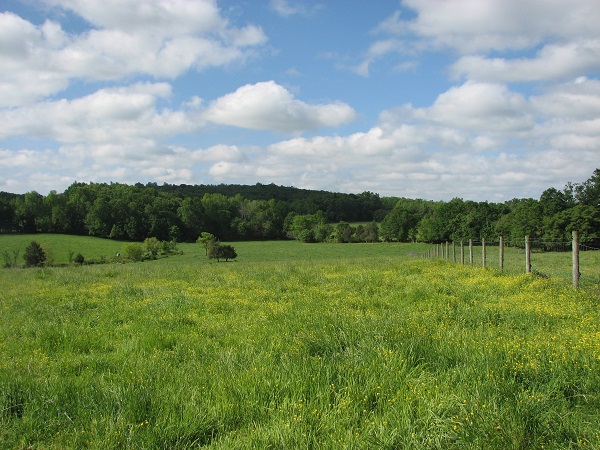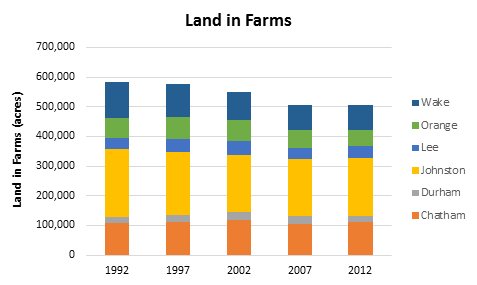By Laura Smith Bob Stoothoff has lived all over the country, but for the last…
By Meredith Wojcik, TLC Volunteer

Chestnut Hill Farm by Jennifer Peterson, 2012
After spending some time working on a research farm in rural North Carolina this summer growing sweet potatoes, I gained an appreciation for not just the tangible things a farm produces, like delicious sweet potatoes, but also for the not-so-tangible things: a feeling of closeness to the land, a sense of pride from the tough, sweaty labor, and most of all, a respect for a way of life that has sustained North Carolinians for centuries. Perhaps even more importantly, I came out of this experience with a passion for protecting North Carolina’s farms. As North Carolina becomes increasingly urban, it’s important that we don’t forget our roots or take for granted the delicious, healthy produce North Carolina farms provide for us.
It’s no secret the Triangle region is growing rapidly; it’s the 11th fastest-growing metropolitan area in the country. And while that might be good news for our local economy, it also has negative ramifications for local farming. Every minute we lose an acre of farmland nationwide, and North Carolina is no exception: every day we lose an estimated 55 acres of farmland.
Farms don’t just provide food for our growing population, but they contribute more than 17% of the state’s income and employ 16% of the work force. They can also have positive impacts on the environment: providing food and cover for wildlife, water filtration, and flood control. Farms also have an invaluable impact on community character, scenic views, and open space. North Carolina takes great pride in its agricultural heritage, and rightfully so, as it contributes $78 billion to the state’s economy and ranks seventh nationally. The state has over 52,000 farmers and produces more tobacco and sweet potatoes than any other state. Ultimately, our state has a lot to be proud of when it comes to agriculture.
When you think of a farm, you probably picture rows upon rows of corn, fields of cotton, or herds of cows ambling about a pasture. You may be surprised to learn that farms are actually defined as “any place from which $1,000 or more of agricultural products were produced and sold” and include places that produce fish, timber, and other products. Here in the Triangle, woodlands actually make up 30% of the total farmland.
The high growth rate in the Triangle means there is a lot of pressure to convert agricultural land to development. In the last twenty years we’ve lost about 80,000 acres of farmland in the Triangle, and in fast-growing Wake County, the amount of farmland has decreased by a third.

Land in farms in the Triangle region. Source: National Agriculture Statistical Service (2015).
It’s not all bad news for farms though. The number of farms in the Triangle region has actually increased slightly over the past twenty years, mainly due to the growth of smaller farms in counties like Orange and Durham.

Number of farms in the Triangle region. Source: National Agriculture Statistical Service (2015).
Farmland protection has long been part of TLC’s core work in the Triangle. Through conservation easements, TLC has assisted family farmers to protect almost 5,000 acres of productive farmland for future generations. For instance, in Chatham County’s traditional and highly productive Silk Hope farm community, TLC has successfully leveraged local, state and federal funding sources on multiple farmland protection projects, cumulatively protecting almost 1,400 acres of prime farmland. In 2013, we protected almost 400 acres of working lands, including the Lindley Farm (see video).
Through TLC initiatives at our Irvin Farm Preserve in Orange County, TLC provides access to farmland for Burmese refugee families who began to resettle in the area several years ago. Since receiving a bequest of the 269-acre Irvin Farm Nature Preserve in Orange County in 2007, TLC has unlocked the land’s assets, benefitting the community by increasing access to fresh food, connecting people with nature, and protecting natural habitats. TLC has restored the agricultural fields, pastures and forest, upgraded infrastructure, and built and managed partnerships with two local nonprofit organizations, Transplanting Traditions Community Farm and Learning Outside. Transplanting Traditions Community Farm provides refugee adults and youth access to farmland, healthy food and agricultural and entrepreneurial opportunities. The farm provides a cultural community space for families to come together, build healthy communities and continue agricultural traditions in the Piedmont of N.C In 2013, 140 adults and children were able to grow vegetables and fruits and launched a community supported agricultural program. Managing our nature preserves to vigorously engage the community with key partnerships allows TLC to support local farms and food and connect people with nature while continuing to steward important open space.
Moving forward, TLC will build on its core farmland protection work to identify and protect traditional farming communities to increase opportunities for local food production by playing a more active role in local food initiatives and helping to make the case for land protection as a key part of the local food economy in our rapidly growing region.
